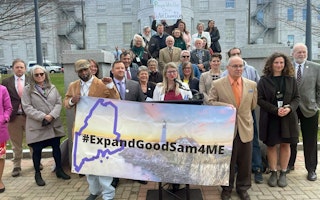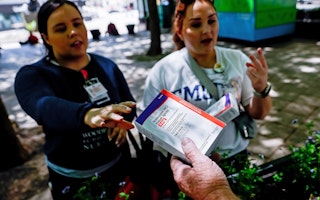Commission on Narcotic Drugs: So Much Agony, So Little Ecstasy
By Joanne Csete
It is a lesson of history that at the end of established regimes, those left in power ratchet up the repression of dissent in their desperate bid to retain power. This phenomenon could be what we’re seeing at the UN Commission on Narcotic Drugs (CND), which met this March in Vienna. Or maybe it’s just that voices challenging the status quo bring out the worst in this particular UN body.
CND is the global drug policy-setting body of the United Nations. International drug policy is fraught with difficult issues that should be deliberated among sovereign states. But CND has long been a place where real deliberation and debate can almost never happen, partly because it works on what is euphemistically called a “consensus” system, which in this case means that any one country can kill a resolution or stop debate. The result is that debate on hard issues is rare, and resolutions of the CND by definition represent “least common denominator” positions on issues that deserve better.
The March 2012 session of the CND was seen by many of the NGOs and others present as showing more cracks in the armour of the prohibitionist status quo than ever before. In some ways this is true. After all, The Czech Republic said in plenary, in essence, that it’s time to throw out the dominant prohibitionist strategies and recognize them for the failure they are. Several Latin American countries said repeatedly that prohibitionism starts out being wrong because it neglects poverty as the root of drug use and ends up wrong because it tramples human rights. Even the International Federation of the Red Cross called for decriminalization of minor drug crimes and denounced the futile pursuit of a “drug-free” society that remains CND’s official strategy.
But these statements pass like mist because CND will not debate them. And civil society, which in most sessions is relegated to a statement or two after the member states have spoken, is especially marginalized in its proceedings. NGO statements this year were vetted by the CND Secretariat—that is, staff of the UN Office on Drugs and Crime—and anything that criticized in any way the positions of the Executive Director of UNODC, whose report to the CND is a big part of the proceedings, was ruled out of bounds. When NGOs complained of censorship, the CND chair said that member states were also asked to submit their statements for vetting ahead of time, but a quick informal survey of country delegates confirmed that this is not so. To add insult to injury, a senior UNODC staff member and the head of INCB lectured NGOs for their behavior, as though having dissenting views is impolite, rather than being the lifeblood of deliberative bodies.
The air of repression remains heavy around the International Narcotics Control Board, whose chairman, Dr. Hamid Ghodse, made statements during CND that represent a new low for this secretive body. Dr. Ghodse clung to the position that the UN drug conventions oblige INCB to be “neutral” when it comes to condemning even the most horrific human rights abuses committed in the name of drug control, including applying the death penalty for drug crimes. But the INCB in its reports is not neutral because it often publicly congratulates countries for repressive policing and even such practices as compulsory drug treatment, which the rest of the UN has now condemned. When an NGO representative suggested, respectfully, that the INCB is legally ill-advised in its interpretation of the conventions and human rights obligations, Dr Ghodse again felt compelled to lecture NGOs about polite behavior.
How long will the INCB and the CND Secretariat be able to dismiss civil society in this way? How long until real debate happens in this global drug policymaking body? How long will it be before the participation of civil society, especially including people who use drugs (continually referred to as “abusers” by INCB), is understood to be essential to moving toward the humane evidence-based, rights-based drug policy that even the most repressive states now routinely refer to in their public statements at CND?
The rhetoric may be improving, but there is a long way to go until the agony of repression in CND and the INCB is lifted. Member states have to be the engine for this change. Civil society—working not for one week in Vienna but for the whole year with national drug authorities—will be needed to ignite that engine.
Joanne Csete is a researcher for the Open Society Public Health Program and Global Drug Policy Program.


